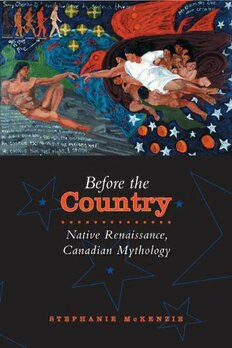
Before the Country: Native Renaissance, Canadian Mythology PDF
Preview Before the Country: Native Renaissance, Canadian Mythology
BEFORE THE COUNTRY: NATIVE RENAISSANCE, CANADIAN MYTHOLOGY In the late 1960s and early 1970s, Canada witnessed an explosion in the production of literary works by Aboriginal writers, a development that some critics have called the Native Renaissance. Before the Country explores the extent to which this body of literature exposed the falla- cies of one specific story, or non-Native national myth, that had been developed at an early date in Canada. In the context of Northrop Frye’s theories of myth, and in light of the attempts of social critics and early anthologists to define Canada and Canadian literature, Stephanie McKenzie suggests ways in which sto- ries react to one another. She examines anew the aesthetics of Native literature and, in a style that is as creative as it is scholarly, incorporates the principles of storytelling into the unfolding of her argument. This strategy not only enlivens her narrative, but also underscores the need for new theoretical strategies in the criticism of Aboriginal literatures. Before the Country invites us to engage in one such endeavour. STEPHANIEMCKENZIE teaches in the Department of English at Sir Wilfred Grenfell College, Corner Brook. This page intentionally left blank STEPHANIE MCKENZIE Before the Country: Native Renaissance, Canadian Mythology UNIVERSITY OF TORONTO PRESS Toronto Buffalo London www.utppublishing.com ©University of Toronto Press Incorporated 2007 Toronto Buffalo London Printed in Canada ISBN 978-0-8020-9208-3 (cloth) ISBN 978-0-8020-9446-9 (paper) Printed on acid-free paper Library and Archives Canada Cataloguing in Publication McKenzie, Stephanie Before the country: native renaissance, Canadian mythology / Stephanie McKenzie. Includes bibliographical references and index. ISBN 978-0-8020-9208-3 (bound) ISBN 978-0-8020-9446-9 (pbk.) 1.Canadian literature (English – Native authors – History and criticism. 2.Canadian literature – 20th century – History and criticism. 3. Nationalism and literature – Canada – History – 20th century. I. Title. PS8089.5.I6M44 2007 C810.9'897 C2007-901140-3 Cover image from the permanent collection of Yukon Arts Centre Public Art Gallery. University of Toronto Press acknowledges the financial assistance to its publish- ing program of the Canada Council for the Arts and the Ontario Arts Council. University of Toronto Press acknowledges the financial support for its publish- ing activities of the Government of Canada through the Book Publishing Industry Development Program (BPIDP). University of Toronto Press acknowledges the publication subvention given to this book by the School of Humanities, Waterford Institute of Technology, Waterford, Ireland. For Doug Beardsley, who introduced me to Canadian literature, and Nang Kiingiaay Laas (Bearer of Good News), Thomas Reginald Kelly, who shared with me some stories and showed me there were different ways of looking at the world. As I write, the centennial of Confederation in 1967 looms up before the country with the moral urgency of a Day of Atonement. – Northrop Frye, ‘Conclusion to a Literary History of Canada’ (1965) in The Bush Garden, 224 This page intentionally left blank Contents Acknowledgments ix Abbreviations xiii Introduction 3 1 The Headwaters of Design 12 2 The Seventh Generation 33 3 Native Literature of the 1960s and 1970s in Canada 54 4 Day of Atonement 114 5 Searching for Sun-Gods: Robert Kroestch’s Badlands and Sky Lee’s Disappearing Moon Cafe 136 6 Admitting the Possibility of Transitional Texts in Canadian Literature 161 Conclusion 180 Notes 191 Works Cited 199 Permissions 215 Index 217 This page intentionally left blank Acknowledgments Warmest thanks and appreciation go to the Head of the School ofHumanities, John Ennis, at Waterford Institute of Technology, Waterford, Ireland, whose school provided publication subvention for this work. Thanks also to friends in Corner Brook, Newfoundland: Elizabeth Beh- rens, Beverley Greene, Brenda Lomond-Carey, Pam Parsons, Pauline Hayes, Darcy Andrews, Allison Stamp, and Louise McGillis, who helped me access information and research and provided valuable help with communication and information technology; Doreen Klassen, Matt Janes, David Freeman, and Martin Ware, who perused late drafts of the manuscript and offered valuable comments; Marc Thackray and Jim Greenlee, who read and offered comments on early drafts of this work; Rainer Baehre, who shared with me certain perspectives as a historian; Rex Brown and Rebekah Robbins, who provided support and help; Adrian Fowler, who lent me the services of a research assistant; and, especially, Nick Novakowski, who provided a writing space and home for me at a crucial stage. A special thank you to Adam Baker, who, as a brilliant undergraduate student, assisted me with two drafts of this book. Thanks, as well, to professional mentors who worked with me when I began shaping ideas as a PhD candidate at the University of Toronto: in particular, thanks to Chelva Kanaganayakam, who was my disserta- tion supervisor and who never let his own interests or agenda control my work; Diana Brydon, who was my external examiner and who offered valuable and intelligent feedback; Heather Murray and Keren Rice, who were committee members, always operating with the utmost integrity. A big thanks, too, to J.E. Chamberlin, under whom I had the
